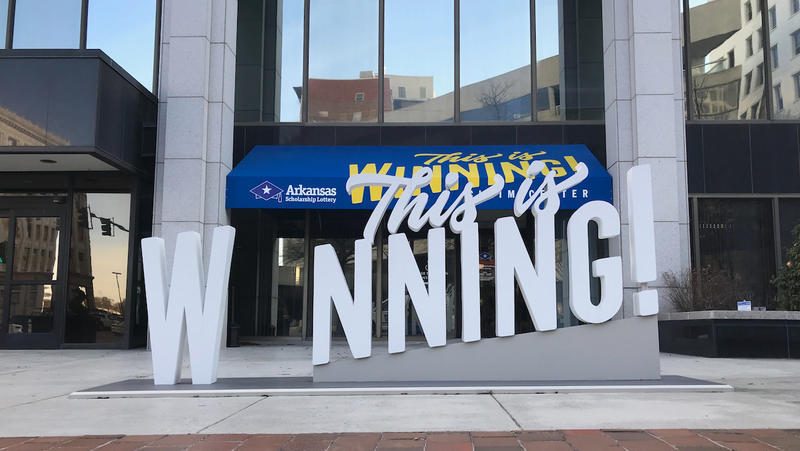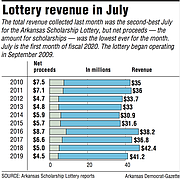The Arkansas Scholarship Lottery's total revenue in July dipped by $1.2 million from the same month a year ago to $41.2 million, but still ranked second-best for the agency for the month in the past 10 years.
However, the lottery last month raised just $4.5 million for college scholarships and that's the lowest amount that the agency has ever raised for the month of July in its decade of operation. The amount also was about $540,000 less than net proceeds raised in the same month a year ago. July is the first month of fiscal 2020.
The monthly revenue report was given Friday to Gov. Asa Hutchinson and the Legislative Council's lottery oversight committee.
The disparity in the two sets of figures -- the bottom-ranking of how much was raised for scholarships versus a high level of total revenue -- is "mainly a cash accrual accounting issue that we have discussed before and see from time to time," lottery Director Bishop Woosley said Friday in a written statement.
July's net income, before transfers for college scholarships, was $8,481,629, he said.
"However, the accrual to cash adjustment for the month was a [negative] $1,955,123, which had an impact on this month's net proceeds," Woosley said. "This is likely due to the large amount of [ticket] activations we saw near the end of last month. This will correct itself in the next few months as it always does."
Woosley then explained ticket activations, which refers to instant tickets, also known as scratch-offs.
"When our retailers receive our instant tickets they are nothing more than a piece of cardboard," he wrote. "Once the tickets are received in the store when they are ready to begin selling the tickets they have to activate them in our system. This makes the tickets live. Once the tickets are activated the retailers have 28 days to pay the lottery for that pack."
July's mixed results come on the heels of the lottery collecting more total revenue and raising more money for scholarships in fiscal 2019 than any previous year. The lottery started selling tickets on Sept. 28, 2009, and has helped finance more than 30,000 Academic Challenge Scholarships in each of the past nine years.
In fiscal 2019, the lottery raised $516.2 million in total revenue, outdistancing the previous year's record of $500.4 million. In fiscal 2019, the lottery raised $98.4 million for scholarships, beating a record set in fiscal 2012.
This fiscal year, Woosley projects total revenue at $497 million and net proceeds at $89.3 million.
Woosley has described his projection as conservative, anticipating some impact from some or all of the gambling that will take place in the state or on its border. The lottery will be affected by expanded casino gambling in the state and by Mississippi's lottery starting up in December, he acknowledged last month.
Earlier this week, Woosley tweeted that it was a pleasure to attend Monday's groundbreaking ceremony of the Saracen Casino in Pine Bluff and "We at @MyARLottery are excited about the opportunities to work together."
Construction is underway on the $350 million casino resort in Jefferson County, which is one of four locations authorized for a casino by constitutional Amendment 100, approved by voters in November.
Amendment 100 allowed Oaklawn Racing Casino Resort in Hot Springs and Southland Gaming and Racing in West Memphis to expand their electronic games of skills machines into casinos. The amendment also opened the door for casinos in Pope and Jefferson counties.
Asked how the Saracen Casino and the lottery would work together, Woosley said that " ... we are currently selling [tickets] in the Saracen Q-store across the street from the casino site."
"It is our hope that we can possibly expand in some way into the casino once it is completed next spring. We also hope that the casino will become a super retailer in the future as well," he said.
In this year's regular session, the Legislature and Hutchinson enacted a state law allowing for a "super retailer' that could cash lottery prizes up to $5,000, said Scott Hardin, a spokesman for the state Department of Finance and Administration. The retailers' normal cashing limit for prizes is $500, and anything above $500 requires a trip to lottery headquarters in Little Rock, he said.
"The super retailers will change that when implemented," he said.
Woosley said that "we would be delighted to have any of the casinos in the state as retailers or super retailers going forward."
The lottery reported it had 1,912 retailers selling tickets as of July 31, down from 1,931 a year ago.
"We had a large chain do a change of ownership late last month and early this month which impacted our active retailer number," Woosley said. "They will be back active next week. In addition, we have begun the process of pulling the rest of our machines from Fred's locations in the state that [are] set to close."
In July, scratch-off ticket revenue increased from $34.4 million to $34.9 million from a year ago, while draw-game revenue dipped from $7.8 million to $6.2 million.
"We had a great launch with some very well received instant tickets," Woosley said.
Draw-game ticket revenue in July dipped from a year ago because "in late July of last year, the Powerball jackpot was over $180 million and the Mega Millions jackpot was over $500 million [and] the jackpots for July of this year have been small," he said.
Beyond the lottery's net proceeds, the Academic Challenge Scholarships also are financed with $20 million a year in general revenue and a $20 million lottery reserve fund that covers temporary cash shortfalls to pay for scholarships before it is replenished.
The state awarded scholarships totaling $91.2 million in fiscal 2019.
"With the changes to the Academic Challenge it's a bit more difficult to predict" what will happen in fiscal 2020, Alisha Lewis, a spokeswoman for the state Division of Higher Education, said in a written statement. "Our current projection is $90.2 [million]."
The total value of scholarships peaked in fiscal 2012 at $132.9 million.
The Legislature cut the size of future scholarships three times over several years because more students than initially projected received the scholarship and net proceeds lagged initial projections before the lottery rebounded in the past few years.
Since then, the Legislature created the Workforce Challenge Scholarship program in 2017, and the Concurrent Challenge Scholarship Program and the Academic Support Scholarship program earlier this year to be funded with net proceeds.
"A bit on the ambitious side, we hope to award $175,000" through the Workforce Challenge Scholarship program in fiscal 2020, Lewis said. The program provides aid up to $800 a year for students enrolled in higher-education programs that lead them to being qualified to work in high-demand occupations.
Metro on 08/10/2019

